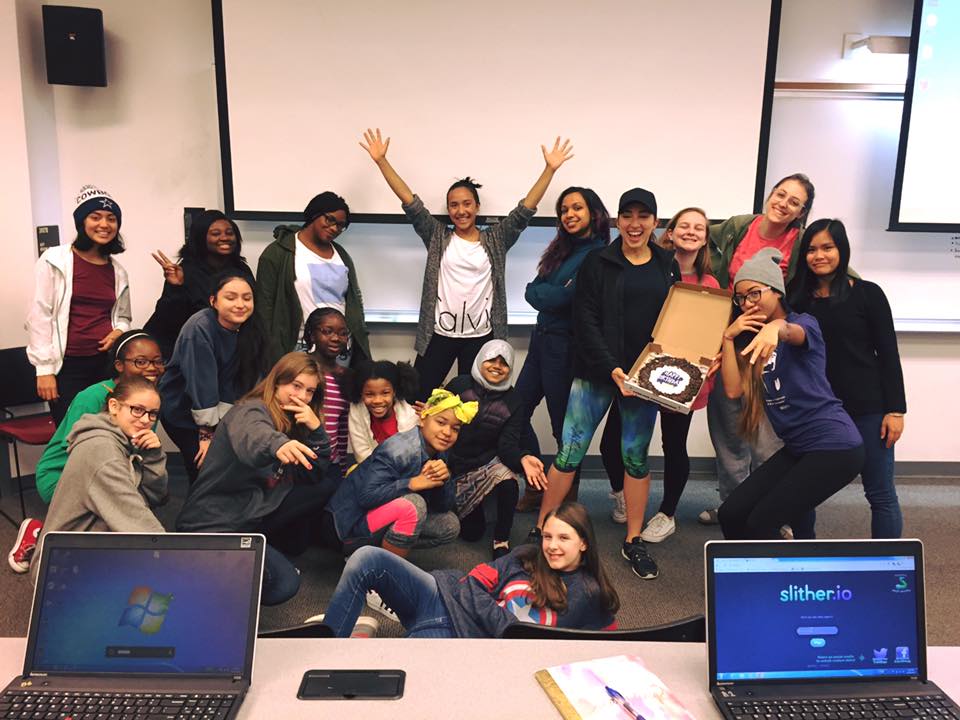Every Sunday for 10 weeks this semester, sixth through 12th graders from up to nearly an hour away came to the University of Maryland to learn how to code. The catch? They were all girls.
Girls Who Code is a national non-profit with localized chapters that hopes to close the gender gap in technology, according to its website. Women hold half of all jobs in the United States but less than one quarter of STEM — science, technology, engineering and math — jobs, according to the U.S. Department of Commerce.
Junior Jenny Mandl, a computer engineering major, discovered the organization through a fellow intern at Microsoft over the summer. She thought it sounded like a great idea, and decided to try it on this campus, she said. This was the first semester that Girls Who Code worked with students at this university.
Despite initial difficulties engaging with local schools to spread awareness of the club, word of mouth set this university’s chapter in motion, and the public had an “overwhelming response” in support of the idea, Mandl said. However, with only 26 laptops at its disposal, the group had to cap registration.
An average of about 20 grade-school girls from local middle and high schools in Maryland came to each meeting, and there were about eight undergraduate student volunteers. The meetings consisted of teaching basic coding, and at the end of the semester students separated into groups and worked on final projects such as developing a virtual organizer, a game and an app. The group also sometimes went to events such as Technica, this university’s all-female hackathon, so students could see women participating in coding.
The students are either facilitators, sponsors or teaching assistants, said Mandl, who is a sponsor and facilitator. Facilitators work with the curriculum and plan events, sponsors work with the logistics such as publicizing the group — and are essentially the chapter founders — and teaching assistants help educate the girls, said Vani Pariyadath, a neuroscientist with the National Institute on Drug Abuse.
Pariyadath was a computer science major in college, and chose to help as a facilitator for this university’s chapter so she could show girls that the skills gained in studying programming can be applied to more than just computer science, she said.
“There are so many fields now that use computational techniques and it can really help in many different situations,” Pariyadath said. “I use it to create and design experiments, to analyze and present data; so many aspects that I can’t imagine what it would have been like if it didn’t have the kind of background.”
The most rewarding part, Mandl said, was offering the girls a chance to see that they can excel in any field or skill they choose.
“You put so much work into this … you pour yourself in and hearing a [positive] response is so incredible,” Mandl said. “Hearing from parents and girls that we inspire them, and … empowering these young girls to pursue things that they might not consider elsewhere. They see other people just like them that are doing this skill.”
Sophomore Olivia Turner, a computer science major, is also a chapter facilitator. One of her goals is to further develop the curriculum so that the girls can learn more advanced program languages to make real websites or apps by the end of the semester.
This semester they taught using Scratch, she said, a free programming language learning tool made for kids. It enables learners to create a representation of what they’d like to design. With a real programming language, they will be able to create real games, apps or whatever they choose, she said.
“Being a computer science major yourself and teaching someone else concepts [are] definitely two very different things, so … what I’m getting out of it is how much the girls can teach you,” Turner said.
For instance, Turner said she’s further developed the skill of thinking on her feet. These girls come from all over, she added, so each week needs to be worth it for them. If something happens, such as no access to computers for the afternoon, Turner said the chapter needs to be able to make it work.
Girls Who Code will return to this university in fall 2017 and will remain limited to fall semester, Mandl said. This will help the group improve the curriculum and have access to more laptops. This university provides laptops and a space for the group to work, Mandl said, and with more time to request the services they will most likely be able to use more at a time.
“Although it’s extremely rewarding, we saw a lot of things that we can improve,” Mandl said. “We have such a greater understanding of how we can make this class more engaging.”



